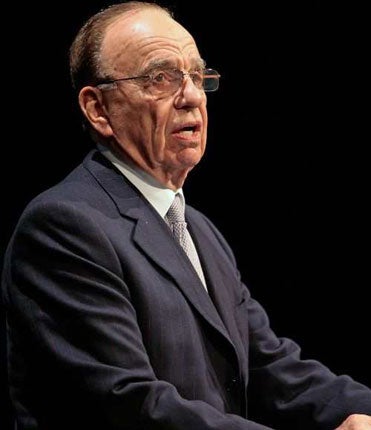Australia, Britain, America – all swept aside. Only world domination will do
Matthew Bell talks to Michael Wolff, author of a 'warts and all' biography of Rupert Murdoch

Your support helps us to tell the story
As your White House correspondent, I ask the tough questions and seek the answers that matter.
Your support enables me to be in the room, pressing for transparency and accountability. Without your contributions, we wouldn't have the resources to challenge those in power.
Your donation makes it possible for us to keep doing this important work, keeping you informed every step of the way to the November election

Andrew Feinberg
White House Correspondent
Many children will, at some point, profess an ambition to be prime minister. But for Rupert Murdoch, governing a single country has never been of interest when the whole world is there for the taking. "He functions as a separate city state," says Michael Wolff, author of a new biography, The Man Who Owns the News.
"When he came to the UK, he wasn't like Maxwell or Conrad Black, who wanted to be approved by the establishment; he doesn't care remotely about that kind of thing. He doesn't want to get along with other cultures or help them. He is a conqueror."
Last year, aged 76, Murdoch bought Dow Jones, the owner of The Wall Street Journal, for $5.6bn (£3.8bn). It was, says Wolff, his retirement present to himself. "He still had some doubts he was the world's last great newspaper proprietor and he wanted to nail that." Wolff believes The New York Times, chief rival to his New York Post, would be the clincher.
It was during the takeover of the WSJ that Wolff, a columnist for Vanity Fair, gained access to Murdoch. Over nine months he saw Murdoch regularly at his New York home, usually dropping in on a Saturday when he was looking after his two children by his second wife Wendi Deng. "He would be relieved to have someone to talk business to," says Wolff.
Wolff's book claims to be the first to reveal the man as a person. A picture emerges of a quixotic, patrician character with no masterplan other than to dominate; he is unhampered by the routine human burdens of self-doubt, self-awareness or any kind of coherent moral code.
Murdoch is, though, above all, a newspaper man. "He lives for newspapers. They are his reason for being," says Wolff. "He doesn't understand modern technology."
Wolff's book, which aims to psychoanalyse Murdoch, concludes there is no underlying reason for his megalomania. What, no Freudian pigeon hole? "A dominating mother and remote father," concedes Wolff. Rupert and his mother, Dame Elisabeth Murdoch, still very much alive aged 99, are not close. Described as formidable, she brought up Rupert and his three sisters in the old upper-class English mould, at arm's length.
"Does Elisabeth revere him? No, not that fondly. But obviously she loves her son."
Does Rupert have a hero? "The only person I ever heard him speak of in a clearly approving way was Silvio Berlusconi. You can see why – he is a media mogul who took over the government." Would Murdoch have liked to have done likewise? "I think he did, in a sense, take over Australia. But Australia is too small for him. The UK is too small. Maybe the US is worthy, but even that wasn't enough – the world was his prize. "
It is revealing to learn who Murdoch favours. "He really likes Gordon Brown," says Wolff. "He has a close identification with him, to the extent that, although there are lots of issues they diverge on, there is nevertheless a clear soul-mate feeling. And Wendi and Sarah Brown also get along."
So there's hope for Brown, after all, not least thanks to Murdoch's apparent detestation of David Cameron. "He doesn't like Cameron at all," says Wolff, "His mouth literally goes into a contortion when he has to consider him. But Rupert gets a lot of pressure from James [Murdoch, his son and a boss at Rupert's News Corporation media empire] and [Sun editor] Rebekah Wade that Cameron is the person they like, and so he speaks about Cameron in a very begrudging way. When it comes to the election, he will do what they want him to do. Right now he says he will support Cameron. But when someone says what they want him to do, he does the exact opposite, so there is no guarantee."
If he wanted to ensure a successful dynastic succession, the obvious move would be to hand over control to one of his children. But which one? "Like all fathers, he has favourites at different moments. He is probably most in love with his eldest son [Lachlan], most respects his second-eldest daughter [Elisabeth], most fears his youngest son [James], and most depends on his eldest daughter [Prudence]."
Thinking about the succession provides Murdoch with hours of entertainment. "He openly speculates on the trouble one of his children might cause the others. A favourite theory is that Lachlan, who he's desperate to get back to work for the company, will buy the Australian operation. He also thinks Elisabeth will be successful enough to buy out her other siblings."
One thing Murdoch cannot control is the future, but he is making every effort to do so. "He has tied up all his children so deeply into the company that, whatever happens, News Corp will always be led by a Murdoch."
Subscribe to Independent Premium to bookmark this article
Want to bookmark your favourite articles and stories to read or reference later? Start your Independent Premium subscription today.
Join our commenting forum
Join thought-provoking conversations, follow other Independent readers and see their replies
Comments